#Karim Sulayman
Explore tagged Tumblr posts
Text
Review: Opera, Chamber, and Orchestral Music @ Spoleto Festival USA
Review: Opera, Chamber, and Orchestral Music @ Spoleto Festival USA
Review: Opera, Chamber, and Orchestral Music @ Spoleto Festival USA By Perry Tannenbaum Recognition of the #BlackLivesMatter Movement and the We See You White American Theatre manifesto (issued by a coalition of BIPOC artists in 2020) were certainly on Nigel Redden’s mind when he decided that the 2021 Spoleto Festival USA would be his last as general director. White and long-tenured at the…

View On WordPress
#Amy Rubin#Anna Thorvaldsdottir#April Hickman#Brandee Younger#Cheryse McLeod Lewis#Coral Dolphin#David C. Woolard#Ebony Williams#Francesco Turrissi#Geoff Nuttall#Jamez McCorkle#John Kennedy#John Taylor Ward#Joshua Higgason#Kaneza Schall#Karim Sulayman#Kellen Gray#Kevin Newberry#Laquita Mitchell#Livia Sohn#Malcolm MacKenzie#Mark Applebaum#Martha Teichner#Mena Mark Hanna#Michael Abels#Michael Commendatore#Micheline Russell-Brown#Nduduzo Makhatini#Omar Ibn Said#Osvaldo Golijov
0 notes
Video
youtube
#it's karim sulayman and monteverdi day at chez lessthansix#si dolce è il tormento#monteverdi#karim sulayman#apollo's fire#music
12 notes
·
View notes
Photo
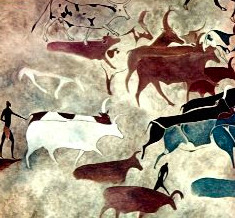
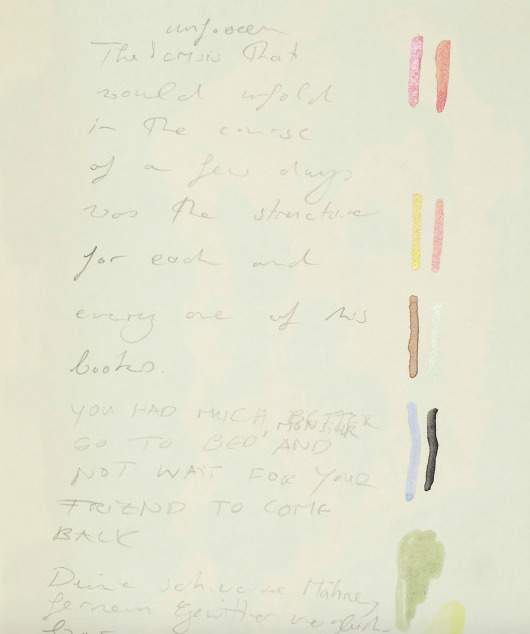

#La Petite école : avec les yeux
Mamadou entre à la Petite école au mois de janvier.… c’est lui qui tombera sur la fève lors de la galette des rois.
Mamadou, c’est un enfant qui retire doucement la main de Daniel qui parfois se pose sur lui un peu brusquement … et lui dit : non, Daniel ! C’est lui aussi qui caresse le dos de Sulayman quand celui-ci se colle à lui.
Mamadou est un enfant peul … et comme d’autres enfants peuls qui sont venus à la Petite école, il se dégage de lui un grand calme, une sorte de sagesse. Ses gestes sont posés, il ne parle pas beaucoup mais sourit souvent. Les enfants plus agités sont attirés par lui et semblent s’apaiser à son contact.
Alors mardi avec Sophie, on se demande d’où vient cette sérénité, ce calme des enfants peuls ?
Et c’est Abdoul Karim, l’ami et professeur de pular de Sophie, qui lui offre cette piste :
« Ce calme est lié à un aspect culturel, c’est lié au fait que c’est un peuple qui transhume beaucoup, qui se meut dans le désert … donc dans notre éducation c’est toujours bien d’être calme pour comprendre le bétail et pouvoir communiquer avec lui. Chez les peuls, avec le bétail la communication passe par des signes sonores certes mais aussi et plutôt par les regards, par des signes physiques. Voilà, moi c’est comme ça que je le conçois et que je l’ai appris par mes grands-parents ».
Le même jour, en fin d’après-midi, je suis en train d’écrire. Mariam, qui est peule elle aussi, passe à côté de moi et me dit : « Tu sais moi j’ai éduqué mes enfants avec les yeux, quand je les regarde, ils savent ce que je pense … voilà c’est tout avec mes yeux ».
4 notes
·
View notes
Video
youtube
You know what: we are in two moods today and this is one of them
Kuando El Rey, a traditional song from Medieval era. From SEPHARDIC JOURNEY - Wanderings of the Spanish Jews, by Apollo’s fire. Singers, in order of appearance, are Jeffrey Strauss, baritone, Karim Sulayman, tenor, and Nell Snaidas, soprano
31 notes
·
View notes
Photo

Tonight’s #sundaycooking is a messy but YUMMY balsamic chicken recipe from the recent @betterhomesandgardens Good-For-You Slow Cooker SIP issue. The sauce didn’t cook down much (possibly because I use a Crock-Pot multicooker instead of an actual slow cooker so the lid doesn’t vent the same, oh well) so when I plated it the sauce went EVERYWHERE necessitating a bowl for my salad 😂 and the recipe makes enough to have leftovers for days, yum 😋 It was nice to quickly throw this in the cooker, finish a book (Brutus and Other Heroines - such a wonderful set of essays about Shakespearean acting from Dame Harriet Walter, if you get a chance try to watch the all-female Julius Caesar she performed in at the Donmar, I believe still streaming on PBS if you have Passport), sew some new masks using a pleated pattern (one came out a little small and one just right, it had room for my pointy nose and somewhat-receding chin so it stays on my face correctly 😂 somehow I’m going to have to procure some elastic bc a) I DESPISE making bias tape and b) ribbon is really slippery), and listen to Schubert leider sung by Karim Sulayman and Ian Bostridge while sewing and yelling at the cats to stop trying to lay on the fabric, eat thread, steal pins, etc. Clearly, the Mittens don’t listen - they like to look pretty and lay in the sun 😹 #cooking #foodie #nomnomnom #cats #catstagram #catsofinstagram #cats_of_instagram #murdermittens #shakespearekitteh #aphrakitteh #books #reading #sewing #coronaviruslife #masks https://www.instagram.com/p/B_dzhRVgnla/?igshid=it9ewtor5gzg
#sundaycooking#cooking#foodie#nomnomnom#cats#catstagram#catsofinstagram#cats_of_instagram#murdermittens#shakespearekitteh#aphrakitteh#books#reading#sewing#coronaviruslife#masks
1 note
·
View note
Text
Characters of the Banu Qasi triology (+ some familiy trees of the Banu Qasi, the emirs and khalifas of Cordoba, the Arista & Jimena dinasties and the Asturian/Leonese kings)
Banu Qasi-Arista Familiy trees from the books:
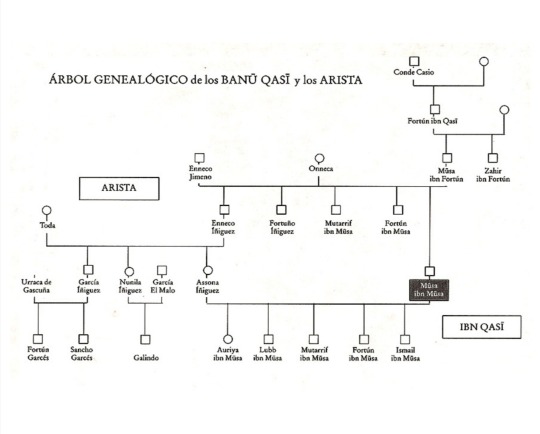
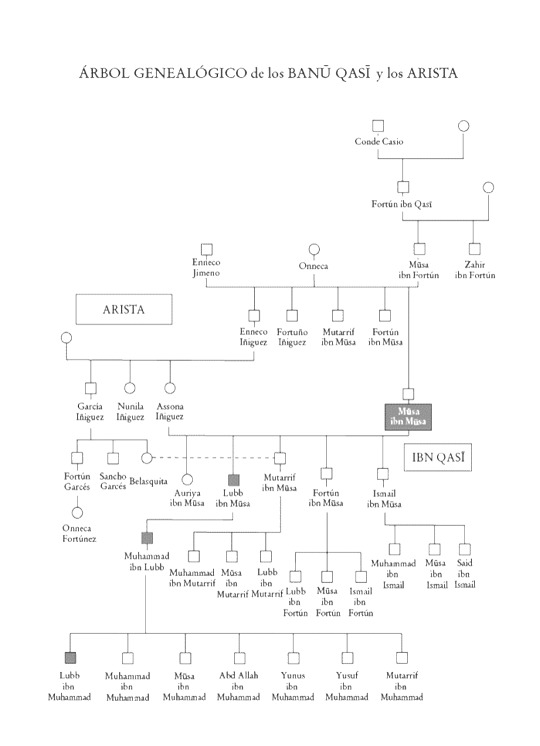
Arista-Jimena & Benu Qasi dinasties family trees I found on Internet:
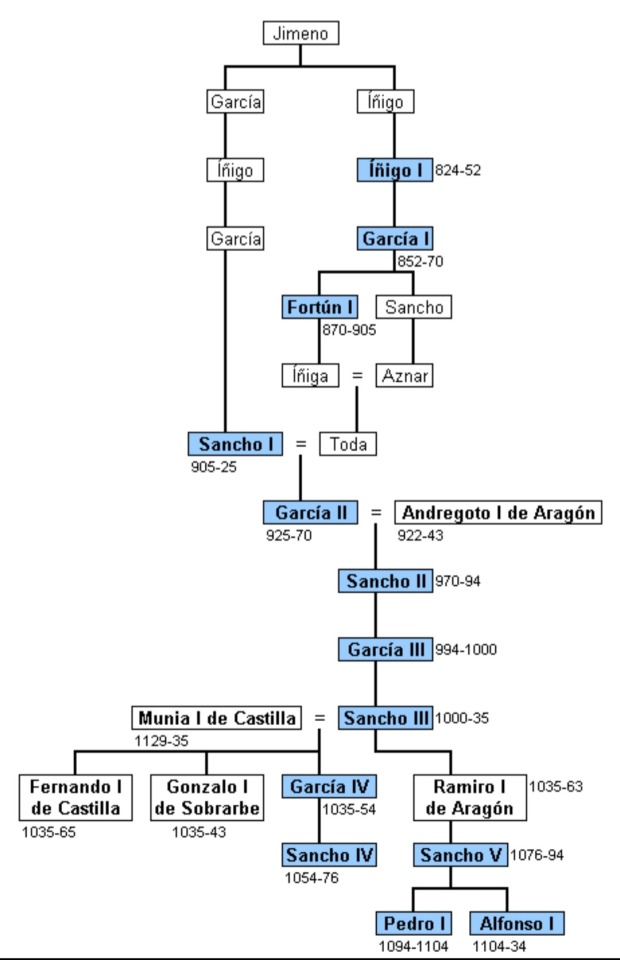
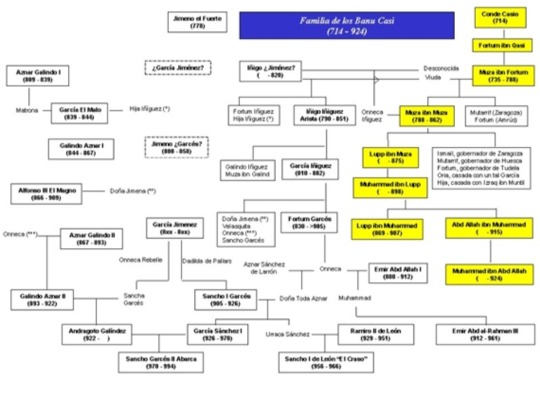
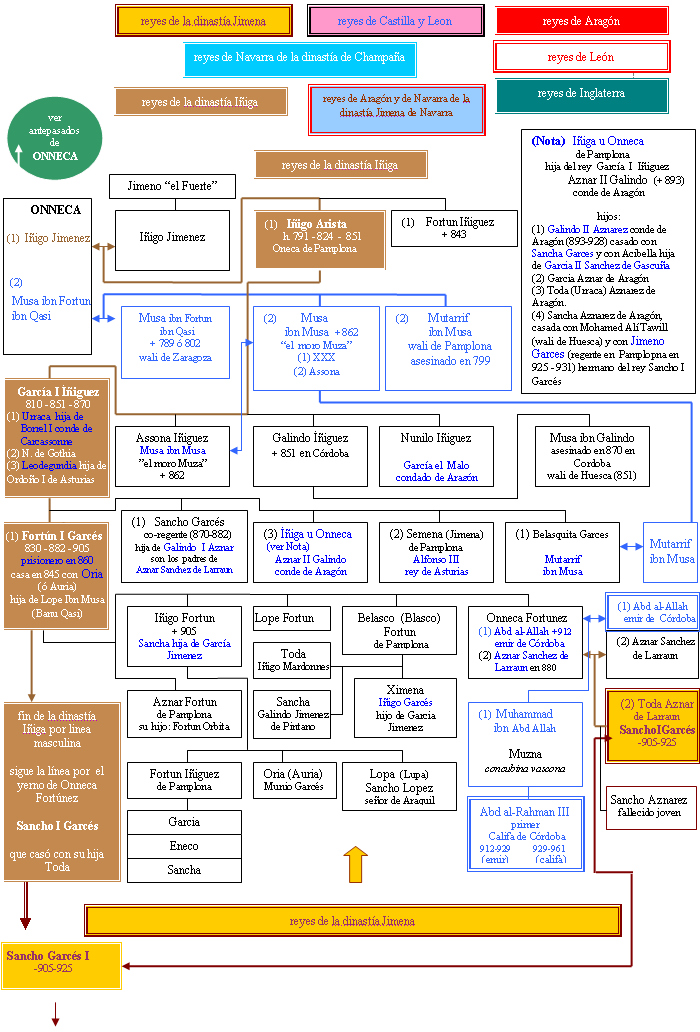
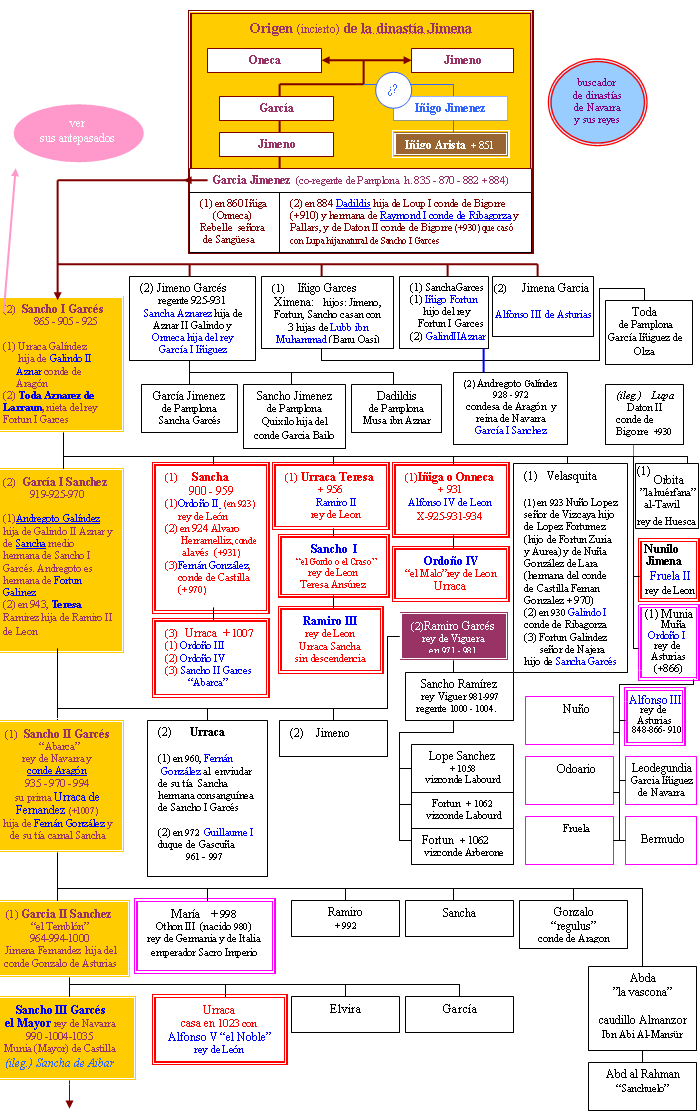
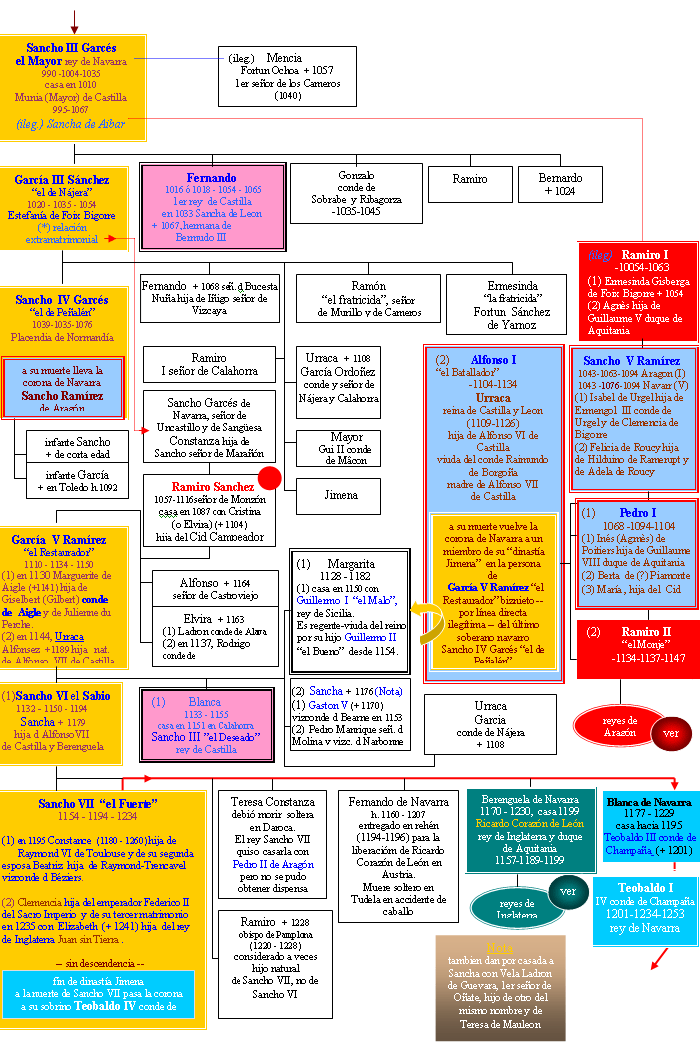
The Asturian-Leonese kings:
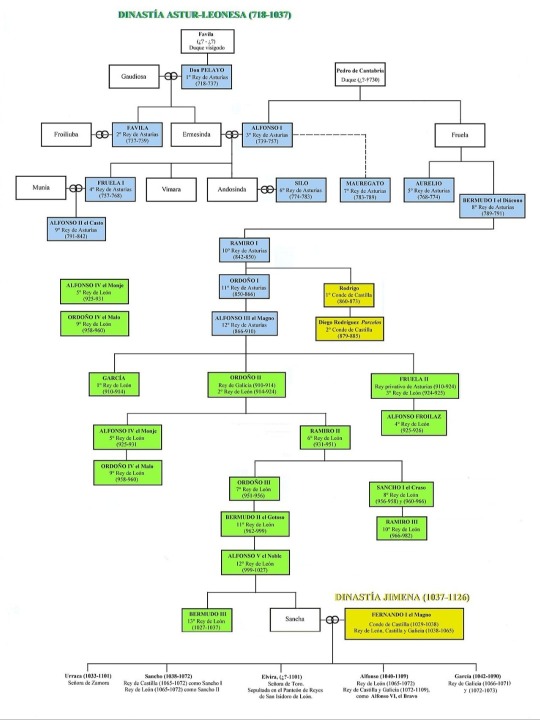
The Umayyad emirs and khalifas of Cordoba (the first ones are the Umayyads from Damascus, the Umayyads from Cordoba start with Abd al Rahman I):
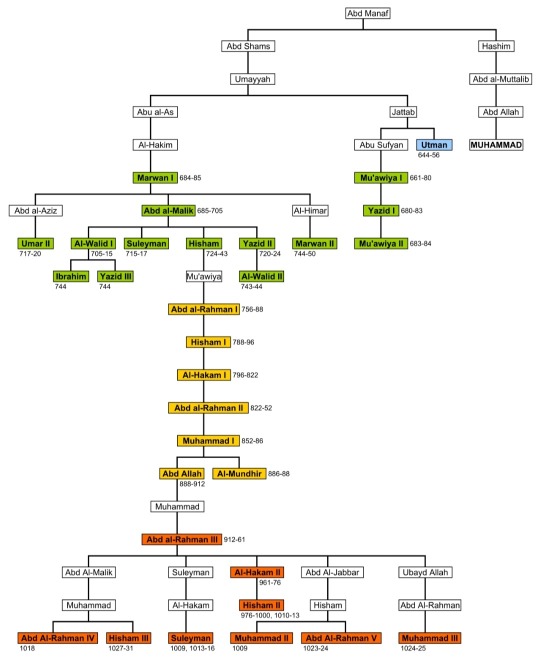
Abulfath Nasr: Eunuch who achieved great influence and power in the court of Abd al Rahman II.
Abd al Karim ibn Mugit: Hayib of Al Hakam I, a prestigious general and trusted man of the emir.
Abban ibn Abd Allah: Son of the emir Abd Allah
Abbas ibn Abd al Aziz: Cordovan General.
Abbas ibn Abd al Barr: Governor of Huesca
Abd al Aziz al Tuchibí: Patriarch of the Tuchibíes
Abd al Aziz: Male son of the emir Abd al Rahman III and his wife Maryam.
Abd al Malik: Eldest son of Al Tawil.
Abd al Rahman I: First Emir of Córdoba (756-788), granson of the khalifa Hisham of Damascus. He was the only survivor of the slaughter of the Umayyads of Damascus carried out by the Abbasids and their supporters. The Abbasids established their caliphate in Baghdad, and Abd al Rahman fled to Al Ándalus and established an independent emirate from Baghdad, the emirate of Cordoba.
Abd al Rahman ibn Marwan: Rebel of the heart of Merida
Abd al Rahman ibn Badr: Son of the hachib Badr ibn Ahmad.
Abd al Rahman ibn Ibrahim ibn Hayay: Son of Ibrahim ibn Hayay, little king of Ishbiliya.
Abd al Rahman ibn Umar: Son of Umar ibn Hafsun.
Abd al Rahman II: Fourth Emir of Córdoba (822-852).
Abd al Rahman III: Eighth emir of Córdoba, son of Muhammad ibn Abd Allah. He succeeded his grandfather after his father's death.
Abd Allah ibn Kulayb: General and Governor with Abd al Rahman II
Abd Allah ibn Yahya: Governor of Zaragoza with Muhammad I
Abd Allah ibn Muhammad: Seventh Emir of Córdoba (888-912), husband of Onneca and father of Muhammad.
Abd Allah ibn Muhammad: Second son of Muhammad ibn Lubb, leader of the Banū Qasī since 907.
Abd Allah ibn Hayay: Arab rebel from Seville
Abd Allah ibn Khalaf: Vali of Barbastro and father-in-law of Ismail ibn Musa
Abd Allah ibn Abd al Rahman: Brother of the emir Hisham I, who fought against him together with Sulayman, the eldest son.
Abd al Walid al Iskandaraní: General of the emir Abd al Rahman II.
Abú Marwám: Second son of the emir Abd al Rahman and Maryam.
Abdel: Fictional character. Slave of Fortún and Onneca in Córdoba
Abu Marwan: Alfaquí from Cordoba
Abu Nasr: Famous archer in the ranks of Ibn Hafsun.
Abu Umayya: One of the sons of the emir Abd Allah.
Abū Yazīd: Chief of the Zenetas tribe.
Adosinda: First wife of Ramiro de León.
Adur: Fictional character. Muzna's brother and thus Abd al Rahman III's uncle.
Adur ibn Badr: Fictional character. Assumed name of the second son of the hachib Badr ibn Ahmad.
Ahmed ibn Qasi: Fictional character. Zahir's relative who lives in Zaragoza.
Ahmad ar-Razi: Cordovan poet.
Ahmad ibn Abd Rabbih: Cordovan poet
Ahmad Al-Barra: Governor of Zaragoza and the Upper March
Ahmad ibn Baqi: Qadi of Qurtuba.
Ahmad ibn Maslama: Sevillian leader, opposed to Ibn Hayay.
Ahmad ibn Muhammad: Brother of the emir Abd Allah.
Ahmad ibn Muhammad ibn Hudayr: Vizier of Abd al Rahman III.
Al Anqar: Mujahid al Tuchibi, Governor of Saraqusta.
Aishun: Chieftain of Archidona
Afrah: fictional character. Concubine in the palace of the governor of Zaragoza
Al Abli: Muladi Poet from Granada
Al Anqar: The One Eyed. Tuchibi Governor of Zaragoza during the siege of the city. Muhammad ibn Abd Allah al Tuchibi (although in the novel he is known as Mujahid to avoid the constant repetition of the same name)
Al Asadí: Arabic poet from Granada
Aisha: Supposed daughter of Fortún, although some sources consider her the daughter of Musa
Al Hakam I: Third Emir of Córdoba (796-822).
Al Harraní: Famous Cordovan doctor in the court of Abd al Rahman II.
Al Mahdi: Ubayd Allah al Mahdi, first Fatimid caliph (909-934).
Al Mundhir: Sixth Emir of Córdoba (886-888).
Al Sarray: Muslim holy man opposed to the power of the emir
Al Tawil: Nickname of Muhammad ibn Abd al Malik, governor of Huesca.
Al Walid ibn Al Hakam: Brother of the emir Abd al Rahman II.
Alfonso Froilaz: Son of Fruela II of León.
Alfonso II: King of Asturias (791-842)
Alfonso III: King of Asturias (866-910). Known as Alfuns among Muslims.
Alfonso IV: Alfonso Ordóñez, King of León.
Almugirah ibn Al Hakam: Brother of the emir Abd al Rahman II.
Álvaro Herrameliz: Count of Álava.
Álvaro de Córdoba: Cordovan monk, friend and biographer of Eulogio de Córdoba.
Amrus ibn Kulayb: General of Abd al Rahman II, brother of Abd Allah ibn Kulayb
Amrus ibn Umar: Muladí who seized power in Huesca
Amrus ibn Yusuf: General of Huesca muladí origin, governor of Talavera, later of Toledo, and later of the Upper Marca. He fortified Tudela in 802, and for this reason he is considered the founder of the city.
Andregoto: Daughter of Galindo Aznar and Sancha Garcés.
Aragonta: Second wife of Ordoño II of León.
Argentea: Daughter of Sulayman ibn Umar.
Aslam ibn Abd al Aziz: First qadi of Abd al Rahman III.
Asbag ibn Isa: Cordovan strategist in the battle of Bulay
Assona Iñiguez: Daughter of Iñigo Arista and Wife of Musa ibn Musa
Auriya ibn Musa: Eldest daughter of Musa ibn Musa. The Arabic name corresponds to the Oria of the Christian chronicles.
Ajab: fictional character. Former slave of Córdoba, wife of Lubb ibn Musa
Ayyub ibn Umar: Firstborn of Umar ibn Hafsun.
Aznar Galindo: Aragonese count faced with the Basques and the Banu Qasi.
Aznar Fortúnez: Son of Fortún Garcés
Aznar Sánchez de Larraón: Son of Sancho Garcés, husband of Onneca Fortúnez, father of Toda Aznárez.
Azzam: Fictional character. Andalusian fisherman, supporter of Ibn Hafsun.
Badr: fictional character. Eunuch of the harem of Abd Allah, died in 891.
Bahlul ibn Marzuq: Huesca rebel faced with the Banu Salama who came to take control of Zaragoza in 799
Banu Anyalin: Family of Sevillian muladíes
Banu Sabariquh: Family of Sevillian muladíes
Bashir: fictional character. One of Umar ibn Hafsun's administrators.
Badr ibn Ahmad: Hachib and trusted man of the emirs Abd Allah and Abd al Rahman III.
Basilio: Bishop of Pamplona.
Bastán: Cordovan Governor of Úbeda, owner of a famous sword that will bear his name.
Belasco Fortúnez: Son of Fortún Garcés
Belasquita Sánchez: Daughter of Sancho Garcés I and Toda Aznárez.
Balask al Yalaski: Velasco el Gascón, a character from Pamplona who was a supporter of Carolingian rule, who will intervene in the life of the city for decades.
Charlemagne: King of the Franks (768-814) who went to Zaragoza in 778. On his return, after destroying Pamplona, the rear of his army was decimated in the battle of Roncesvalles. Creator of the Hispanic March, in the year 800 he had himself crowned emperor by Pope Leo III
Céntulo Aznárez: Son of Count Aznar Galindo
Columba: Wife of Sulayman ibn Umar, mother of Argentea.
Count Casio: Visigothic count who dominated the lands of the Ebro upon the arrival of the Muslims in 711. He adopted the faith of the conquerors and became the mawla of the caliph of Damascus, thus preserving his rights and the government of his lands. His descendants, the Banū Qasī, would maintain this power for generations.
Count Eblo: Count of Gascony, sent by Ludovico against Pamplona
Count Gastón: Brother of Ordoño I, general of the Christian army.
Dadildis de Pallars: Mother of Sancho Garcés I.
Diego de Salazar: Fictional character. Pamplona gentleman.
Diego Rodríguez: Count at the service of Alfonso III, one of the officers of his hosts.
Dulce: Cordovan martyr.
Dulcidio: Leonese cleric, ambassador in the Cordovan court.
Damian: Fictional character. Mozarabic collaborator from Huesca who helps Belasquita.
Elvira: First wife of Ordoño II.
Elvira: fictional character. One of Burbaster's hermit nuns.
Enneco Fortúnez: First son of Fortún Garcés.
Enneco Garcés: Regent of Pamplona until the death of Fortún Garcés in 905.
Enneco Iñiguez: known as Iñigo Arista, the first king of Pamplona, blood brother of Musa ibn Musa
Enneco Jimeno: Basque leader, Onneca's first husband, father of Enneco Arista and Fortuño
Eulogio de Córdoba: Religious from Córdoba, promoter of the Mozarabic response to the emir.
Eugenia: Cordovan martyr.
Eugenia: fictional character. One of Burbaster's hermit nuns.
Eulogio: Bishop of Córdoba.
Fatima al Qurayshiya: First wife of Emir Abd al Rahman III.
Fortún Garcés: Son of García Iñiguez. He remained a hostage in Córdoba between 860 and 880. He returned as King of Pamplona, although he abdicated before his death in 905. His successor was Sancho Garcés I.
Fortún ibn Musa: Fourth son of Musa ibn Musa.
Fortún ibn Qasi: Son of Count Casio, father of Musa and Zahir ibn Fortún.
Fortuño Iñiguez: Brother of Enneco Arista, son of Enneco Jimeno and Onneca.
Fortuño: Fictional character. Abbot of the Monastery of Leyre.
Fray Aurelio: Fictional character. Burbaster Monk.
Galindo: Bishop of Pamplona.
Galindo Aznar: Count of Aragon.
Galindo Belascotenes: Father of García the Bad, lord of Cerretania until his removal from power by Aznar Galindo.
Galindo Aznárez: Son of Count Aznar Galindo
Galindo Garcés: Son of García the Bad and Nunila Galindo
Iñiguez: Fictional character. Alleged adoptive brother of García Iñiguez
Garcia I: First King of Leon.
García the Bad: Aragonese leader, faced with Aznar Galindo, who married Nunila, Enneco's daughter. Also known as Garcia from Sirtaniya.
García Garcés: Basque knight, husband of Auriya and son-in-law of Musa.
García Iñiguez: King of Pamplona (852-882)
García Sánchez: Son of Sancho Garcés I and Toda Aznárez.
García Ximenez: One of the Basque seniors, related to the Arista. He married several of his sons and daughters to sons and grandsons of the King of Pamplona. Father of Sancho Garcés I.
Garsiya: Fictional character. Basque businessman settled in Huesca.
Goto Núñez: Wife of King Sancho de León.
Guifrid/Wifredo the Hairy: First count of Barcelona.
Habiba: fictional character. Concubine in the palace of the governor of Zaragoza.
Habil: fictional character. Confidence man of Umar ibn Hafsun, in charge of finances.
Haddad: fictional character. One of Umar ibn Hafsun's administrators.
Hafsun: Father of Umar ibn Hafsun
Hafs ibn Umar: Son of Umar ibn Hafsun.
Hafs al Mur: Lieutenant of Umar ibn Hafsun
Hakim: Fictional character. Representative of the muladíes
Hana: fictional character. Wife of Abd Allah ibn Muhammad.
Hakam ibn Atinah: Governor of Toledo
Harith ibn Hamdum: Lord of Al Hamma
Harith ibn Bazi: General of the emir Abd al Rahman and governor of Zaragoza
Hāsim al Tuchibí: Son of Al Anqar.
Haxim ibn Al Aziz: General and hachib of the emir Muhammad I.
Hazine: fictional character. Concubine of Muhammad ibn Abd Allah Hermenegildo: Bishop of Compostela.
Hermogio: Bishop of Zamora, captured in the battle of Muez.
Hisam I: Second Emir of Córdoba (789-796).
Ibn Abd Rabbihi: Cordovan poet.
Ibn Abí Abda: Prestigious general, commander of the Cordovan army.
Ibn al-Wárit: Cordovan general. Ibn Basil: Cordovan general.
Ibn Bizant: Christian Governor of Úbeda.
Ibn Firnás: Andalusian poet of Maghrebi origins and scientist in the court of Abd al Rahman II. Among other, things he is considered the father of Aviation, Abbas Ibn Firnas created the first glider, and he achieve to soar over the city of Córdoba during brief flights in 9th century
Ibn Galib: Muladí officer under the orders of the emir Abd Allah
Ibn Mastana: Lieutenant of Umar ibn Hafsun.
Ibn Nabíl: Captain of Ibn Hafsún. Ibn Rudmir: Fictional character. They are of Rudmir, one of Burbaster's Christian captains.
Ibn Tumlús: Cordovan general.
Ibn Zennun: Toledo rebel
Ibrahim: Fictional character. Master builder of Muhammad ibn Lubb in Zaragoza
Ibrahim ibn Hayay: Arab Governor of Ishbiliya.
Idris I: Descendant of Muhammad, founder of the Idrisí caliphate with its capital in Fez.
Isa ibn Ahmad: Vizier of Abd al Rahman III.
Ishaq: fictional character. Ibn Hafsun's lieutenant.
Ismail ibn Badr: Cordovan poet.
Ismail ibn Fortún: Eldest son of Fortún ibn Musa
Ismail ibn Mūsa: Younger son of Mūsa ibn Mūsa.
Izraq ibn Mantil: Governor of Guadalajara, husband of Aisha.
Jawhar: fictional character. Muhammad ibn Lubb's officer in Saraqusta
Jazar ibn Mu'min: Senior officer of the Cordovan army confronted with Musa
Khaled: Fictional character. Head of the souk in Zaragoza.
Kurayb ibn Khaldún: Arab rebel from Seville.
Leodegundia: Daughter of Ordoño I of Asturias, second wife of García Iñiguez, King of Pamplona.
Lope=Lubb, its arabized form, lubb comes from latin lup, meaning wolf
Lubb ibn Fortun: Son of Fortun ibn Musa
Lubb ibn Muhammad: Son of Muhammad ibn Lubb, leader of the Banū Qasī since the year 898. Also known by the family name of Lubb ibn Qasī.
Lubb ibn Mutarrif: Son of Mutarrif ibn Musa
Lubb ibn Musa: Second son of Musa ibn Musa
Ludovico Pio: Son of Charlemagne. Emperor and King of the Franks from 814 to 840
Ludriq: Asturian knight that Fortún ibn Musa faced in his first campaign. It corresponds to the name of Rodrigo.
Maqsim: Bishop of Burbaster.
Maryam: Concubine and later wife of Emir Abd al Rahman III.
Maslama: Captain of Ibn Hafsun
Masud ibn Amrus: Son of Amrus ibn Umar, governor of Huesca like him
Matrona: Daughter of Aznar Galindo, first wife of García el Malo
Matruh ibn Sulayman: Chief of the Yemenis of Saragossa, evicted from power and died in 791
Mikhail: fictional character. Muhammad ibn Lubb's trusted official.
Moisés de Rada: Fictional character. Mozarabic doctor from Zaragoza.
Mudahir: Uncle of Umar ibn Hafsun
Muhagir ibn Alqatil: Leader of the Toledo rebels.
Muhammad I: Fifth Emir of Córdoba (852-886).
Muhammad ibn Abd Allah : First-born son of the emir Abd Allah and Onneca Fortúnez.
Muhammad ibn Ibrahim ibn Hayay: Son of Ibrahim ibn Hayay, little king of Ishbiliya.
Muhammad ibn Ismail: Son of Ismail ibn Mūsa, cousin of Lubb ibn Muhammad.
Muhammad ibn Lubb: Eldest son of Lubb ibn Mūsa, leader of the Banū Qasī until 898.
Muhammad ibn Lubb: Son of Lubb ibn Muhammad, leader of the Banū Qasī since 915.
Muhammad ibn Mutarrif: Son of Mutarrif ibn Musa
Muhammad ibn Rustum: Fictional character. General of the emir Abd al Rahman Mukhtar. Sahib al Suq of Tudela
Mutarrif ibn Salma: First qādi of Córdoba in the time of Abd Allah
Munia Sánchez: Daughter of Sancho Garcés I and Toda Aznárez.
Mūsa ibn Abd Allah: Supposed last leader of the Banū Qasī, second son of Abd Allah ibn Muhammad.
Musa Ibn Fortún: Father of Musa ibn Musa and brother of Nashir. Died in Zaragoza in 788 before the birth of his son Musa
Musa ibn Fortún: Son of Fortún ibn Musa, from Tudela.
Musa ibn Ismail: Son of Ismail ibn Musa
Musa ibn Galind: Governor of Huesca
Mūsa ibn Muhammad ibn Hudayr: Vizier of Abd al Rahman III.
Mūsa ibn Muhammad ibn Sa'id: Hachib of Abd al Rahman III.
Mūsa ibn Mūsa: Muladī, chief chieftain of the Banū Qasī (788-862). He came to be considered "the third king of Spain" by Christian chronicles. Enneco Arista's blood brother.
Musa Ibn Mutarrif: Son of Mutarrif ibn Musa
Mūsa ibn Nusayr (640, Saudi Arabia –716/718, Damascus or Hijaz) Yemeni conqueror of the Iberian Peninsula during the rule of khalifa Walid I of Damascus in 711 along with Tariq ibn Ziyad. He was governor of Ifriqiya (Tunisia) between 704 and 712 and first governor of Al Ándalus (712-714). His son, Abd al-Aziz ibn Musa ibn Nusair (685, Egypt or Iraq-716, Seville) was the second governor of Al Ándalus (714-716), he married Egilona (the widow of Rodrigo, the last Visigothic king), and their daughter, Aïcha or Asima bint Abd al-Aziz, married Fortún ibn Qasi (before 740– Zaragoza, 788), and their sons were Musa and Nashir ibn Fortún
Mutarrif ibn Musa: Third son of Musa ibn Musa, married to Belasquita of Pamplona
Mutarrif ibn Abd Allah: Second son of the emir Abd Allah, murderer of his brother Muhammad, the eldest son.
Mutarrif ibn Di-l-Nun: Berber leader of the Santaver district.
Mutarrif ibn Muhammad: Third son of Muhammad ibn Lubb, governor of Toledo since 898.
Muzna: Mother of Abd al-Rahman III, Basque.
Nayat: fictional character. Midwife of the emir's harem.
Nicholas: fictional character. Burbaster boy.
Nora: fictional character. Assumed name of the wife of the hachib Badr ibn Ahmad
Onneca: Mother of Mutarrif, Fortún and Musa ibn Musa, first married to Enneco Jiméno, with whom he had his first two children: Iñigo Iñiguez (Iñigo Arista) and Fortún Iñiguez.
Onneca Fortúnez: Daughter of King Fortún Garcés, captive with him in Córdoba for 20 years. There she married Prince Abd Allah, later emir, to be the mother of their firstborn, and grandmother of Abd al Rahman III, the first caliph of Córdoba.
Onneca Sánchez: Second daughter of Sancho Garcés I and Toda Aznárez
Onneca Rebelle: First wife of García Ximenez de Pamplona
Órbita Sánchez: Younger daughter of Sancho Garcés I and Toda Aznárez
Ordoño I: King of Asturias (850-866)
Ordoño II: King of León at the beginning of the 10th century. Urdūn for the Arabs.
Rashida: Fictional character, mother of Mutarrif ibn Abd Allah, wife of Prince Abd Allah
Recafredo: Metropolitan Bishop of Córdoba in the time of Muhammad I
Pedro: First abbot of the monastery of Albeda
Pelayo: young Christian martyr from Córdoba
Perfecto: Christian priest of Córdoba.
Qalam: Slave, singer and versatile woman of Basque origin transferred to Medina and from there to the court of Abd al Rahman II.
Raissa: fictional character. Wife of Mutarrif ibn Muhammad
Rabbi ben Teodulfo: Qumis from Córdoba of Christian origin who came to control the finances of the emirate during the reign of Al Hakam I
Ramiro I: King of Asturias (842-850)
Ramiro: Third son of Ordoño II of León
Ramón de Pallars: Count of Pallars
Rudmir: Captain of Ibn Hafsun
Sabrit: Muladí from Huesca related to Amrus ibn Yusuf, origin of the Banu Sabrit family
Sa'id ibn Al Mundhir: Governor of Guadalajara
Sa'id ibn Al Hudayl: Rebel faithful to Ibn Hafsun
Sa'id ibn Al Nabil: Cordovan Army Officer
Sa'id ibn Al Ya'la: Cordovan Army Officer
Sa'id ibn Amrú al Akri: Cordovan poet
Sa'dun: High-ranking official in the court of Abd al Rahman II, substitute for eunuch Nasr
Sa'dun al Ru'ayní: Zado. Governor of Barcelona until the conquest by the Franks in 801
Sadun al-Surumbaqi: Lieutenant of Ibn Marwan
Sahra: fictional character. Wife of Muhammad ibn Lubb, mother of Lubb ibn Muhammad.
Said: fictional character. Supporter of Amrus ibn Umar in Huesca
Said ibn Ismail: Son of Ismail ibn Musa
Said al Husayn: Protagonist of the rebellion against the emir in Zaragoza in 788
Salvador: Fictional character. Herbalist brother from a monastery in Albeda.
Samuel: Christian name of Sulayman ibn Umar
Sancha Aznárez: Daughter of Onneca Fortúnez and Aznar Sánchez
Sancha Sánchez: eldest daughter of Sancho Garcés I and Toda Aznárez
Sancha Garcés: Daughter of García Ximenez, wife of Enneco Fortúnez
Sancho Aznárez: Son of Onneca Fortúnez and Aznar Sánchez
Sancho: fictional character. Abbot of Leyre
Sancho Aznárez: husband of Toda Aznárez, king of Pamplona since 905
Sancho Ordóñez: Eldest son of Ordoño II of León
Sancho Garcés: Second son of García Iñiguez, regent during the captivity of his brother Fortún in Córdoba.
Sarband: Servando, son of the Christian count of Córdoba of the same name
Sawar ibn Hamdum: Arab rebel from Granada.
Sayida: Daughter of Al Tawil, wife of Lubb ibn Muhammad
Sebastian: Fictional character. Supposed name of the monk who helped Musa after the battle of Clavijo
Servando: Christian Count of Córdoba
Shamena: supposed first wife of Lubb ibn Muhammad
Sulayman ibn Umar: Son of Umar ibn Hafsun
Sulaaf ibn Hazim: Fictional character. Military chief of the Tudela garrison
Sulayman ibn Abd al Rahman: Eldest son of the first emir who fought for the succession against his brother Hisham I
Talal: fictional character. Christian boy imprisoned in an aceifa and turned into a eunuch of the fortress
Tariq ibn Ziyad: Maghrebi conqueror of the Iberian Peninsula in 711, lieutenant of Musa ibn Nusayr.
Tarub: Wife of Abd al Rahman, mother of his son Abd Allah
Temam ibn Alqama: Chancellor of the Al Mundhir government
Toda: Wife of Iñigo Arista, mother of García, Assona and Nunila Iñiguez.
Toda Aznárez: Daughter of Onneca Fortúnez and Wife of Sancho Garcés I
Ubayd Allah: Son of Abd al Rahman III and his wife Maryam
Ubayd Allah ibn Muhammad: Vanguard General at the Battle of Bulay
Ubayd Allah: General from Córdoba, protagonist of a large number of wars against the Christian lands of the north
Umar ibn Ayyub: Grandson of Umar ibn Hafsun
Umar ibn Hafsun: Malaga rebel who managed to put the emirate of Qurtuba to the test
Umaya ibn Abd Al Gafir: Governor of Seville envoy of the emir Abd Allah
Urdūn: Arabic name for Ordoño
Urraca Sánchez: Third daughter of Sancho Garcés I and Toda Aznárez
Urraca of Gascony: First wife of García Iñiguez, mother of Fortún Garcés
Vela Jiménez: Count at the service of Alfonso III
Walid ibn Ganim: General of Emir Muhammad I
Wanyat: Governor of Arnedo, deposed by Lubb ibn Musa
Wadinás: Captain of Ibn Hafsún
Willesindo: Bishop of Pamplona
Wuhayb (father): Governor of Zaragoza
Wuhayb (son): Governor of Tudela
Ximena: Pamplona princess, married to Alfonso III of Asturias, mother of Ordoño II.
Ximeno: Bishop of Pamplona in the time of Fortun Garcés
Ximeno Garcés: Brother of Sancho Garcés I and husband of Sancha Aznárez
Ximena Belasco: Daughter of Belasco Fortúnez, married to a son of García Ximenez.
Ya'far ibn Umar: Son of Umar ibn Hafsun
Yahya: boy who helps Musa after the battle of Albelda
Yahya ibn Idris: Yahya IV, Emir of Idris
Yahya ibn Ishaq: Jewish court physician of Cordoba
Ya'ad ibn Abd al Gafir: Governor of Ilvira (Granada), sent to Seville by Abd Allah
Yahya ibn Abd Al Aziz: Prosecutor in the trial against Muhammad
Ya'qūb ibn Abí: Officer of the Cordovan army
Yasar: fictional character. One of Umar ibn Hafsun's administrators
Yaziz: fictional character. Mercenary in the service of Ismail ibn Musa
Yunus ibn Muhammad: Son of Muhammad ibn Lubb, and brother of Lubb ibn Muhammad
Yusuf ibn Muhammad: Son of Muhammad ibn Lubb, and brother of Lubb ibn Muhammad
Zakariyya: Fictional character. Supposed childhood name of the character who will be known as Badr ibn Ahmad
Zakariyya ibn Amrus: Member of the Banu Amrus of Huesca
Ziryab: Musician, writer and multifaceted member of the Cordovan court, coming from the Baghdad court
Ziyad ibn Hud: Fictional character. Musa ibn Musa's childhood friend
Etymology II Locations
0 notes
Text
Songs of Orpheus Karim Sulayman
Guys I am Obsessed with this album
1 note
·
View note
Photo
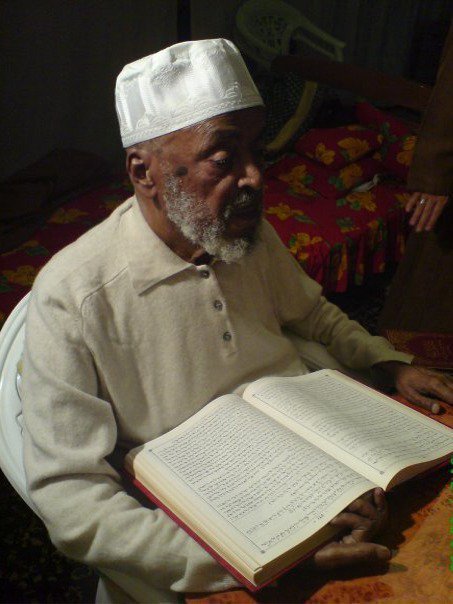
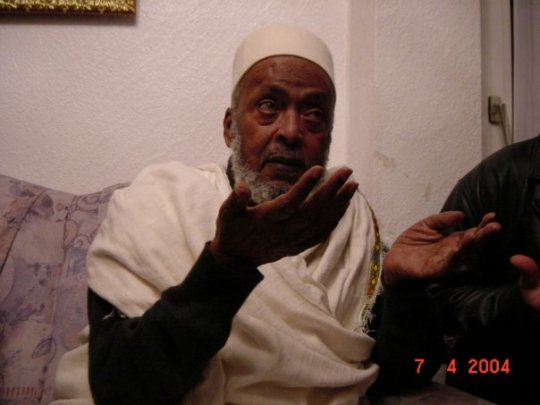
A BIOGRAPHY OF
ASH-SHAYKH ^ABDULLAH AL-HARARIYY
He is the great ^alim (Islamic scholar), an example of the ^ulama' (Islamic scholars), al-'Imam, al-Muhaddith, the pious worshipper, ash-Shaykh Abu ^Abdir-Rahman, ^Abdullah Ibn Muhammad Ibn Yusuf, al-Harariyy, ash-Shaybiyy, al-^Abdariyy, the Mufti of as-Sumal (Somalia). He is al-Harariyy because he is from the city of Harar. In 1887, as-Sumal was occupied and divided into five parts and the western province (Harar) was given to al-Habashah (Ethiopia). He is ash-Shaybiyy because Banu Shaybah is a clan of Quraysh and they are the people in charge of al-Ka^bah. He is al-^Abdariyy because he also belongs to ^Abd-ud-Dar, a clan of Qusayy Ibn Kilab, the fourth grandfather of Prophet Muhammad, sallallahu ^alayhi wa sallam.
He was born in Harar around 1339 A.H., or 1920 R.C. He grew up in a humble house loving al-^Ilm (Islamic knowledge) and its people. He memorized al-Qur'an by heart and tartil (reading correctly with tajwid rules) when he was seven years old. He continued to scoop from the sea of knowledge. He memorized numerous books in various Islamic sciences. He gave ^Ilm al-Hadith a great amount of attention. He memorized the six books of al-Hadith (al-Bukhariyy, Muslim, at-Tirmithiyy, Abu Dawud, Ibn Majah, An-Nasa'iyy) and other books of al-Hadith with their isnad (names and biographies of the chains of relators). He was authorized by al-^ulama' to pass al-fatwa and to relate al-Hadith when he was less than eighteen years old.
He was not satisified with taking knowledge only from al-^ulama' of his own city. He went to many places in al-Habashah and as-Sumal seeking knowledge and its people. He had many trips with hardships and difficulties, but he did not care about them; whenever he heard about an ^alim he went to him, which is the habit of the righteous Salaf (Muslim scholars of the first 300 Hijriyyah years).
His intelligence and wonderful memory helped him get in depth in al-Fiqh ash-Shafi^iyy (Islamic knowledge following al-'Imam ash-Shafi^iyy), and also the same in al-Fiqh al-Malikiyy, al-Hanafiyy, and al-Hanbaliyy, so that he became a person at whom fingers point; people would come to him from different places in al-Habashah and as-Sumal. He became the Mufti of as-Sumal (the highest religious authority qualified to pass Islamic judgements).
He took al-Fiqh ash-Shafi^iyy and its Usul (science of inferring rules and judgements) and an-Nahw (Arabic Grammar) from al-^alim ash-Shaykh Muhammad ^Abdus-Salam al-Harariyy, ash-Shaykh Muhammad ^Umar Jami^ al-Harariyy, ash-Shaykh Muhammad Rashad al-Habashiyy, ash-Shaykh Ibrahim Abil-Ghayth Al-Harariyy, ash-Shaykh Yunus al-Habashiyy, and ash-Shaykh Muhammad Siraj al-Jabartiyy. From those ^ulama' (Islamic scholars) he took many main texts such as Alfiyyat-uz-Zubad, at-Tanbih, al-Minhaj, Alfiyyat-ubni-Malik, al-Luma^ by ash-Shiraziyy and other main texts.
He took the sciences of the Arabic Language, especially from the righteous Shaykh Ahmad al-Basir and ash-Shaykh Ahmad ibn Muhammad al-Habashiyy and others. He read the Fiqh of the three Mathahib and their Usul under ash-Shaykh Muhammad al-^Arabiyy al-Fasiyy, and ash-Shaykh ^Abdur-Rahman al-Habashiyy. He took at-Tafsir (science of explanation of al-Qur’an) from ash-Shaykh Sharif al-Habashiyy in his town, Jummah.
He took al-Hadith and its sciences from many teachers notably from al-Hafiz ash-Shaykh Abu Bakr Muhammad Siraj al-Jabartiyy, the Mufti of al-Habashah, and ash-Shaykh ^Abdur-Rahman ^Abdullah al-Habashiyy, and others.
He met with the righteous Shaykh, al-Muhaddith, al-Qari' (Reciter of al-Qur'an), Ahmad Ibn ^Abdil-Muttalib, the Head of the Qurra' (plural of Qari') in al-Masjid-ul-Haram in Makkah (he was appointed as the Imam and Shaykh of al-Masjid-ul-Haram by as-Sultan ^Abdul-Hamid II, the last Muslim, Ottoman Khalifah). From this Shaykh he took the 14 ways of reciting al-Qur'an, as well as ^Ilm al-Hadith and he also met ash-Shaykh, al-Qari', Dawud al-Jabartiyy.
He started giving classes at a young age for the students who were maybe older than he was; so he was both learning and teaching. He was superior in both al-Habashah and as-Sumal to his peers in knowing the biographies of the people of al-Hadith and their ranks, and memorizing the texts and getting in depth in the sciences of as-Sunnah, language, Tafsir, and others.
He did not leave any known Islamic science without mastering it. He may talk about some knowledge or science and a person may think that he specialized in that only. You would see him humbly listening to a Hadith with his ear and his heart, although he knows better about it than the speaker himself.
He went to Makkah and met its ^ulama' such as ash-Shaykh, al-^Alim, as-Sayyid, ^Alawiyy al-Malikiyy, and ash-Shaykh Amin al-Kutubiyy. He attended circles by ash-Shaykh Muhammad al-^Arabiyy at-Tabban. He contacted ash-Shaykh ^Abdul-Ghafur an-Naqshabandiyy and took at-Tariqah an-Naqshabandiyyah from him .
Afterwards, he went to al-Madinah and contacted its ^ulama'. He took al-Hadith from ash-Shaykh Muhammad Ibn Muhammad as-Siddiqiyy al-Bakriyy. He stayed by and in ^Arif Hikmat and al-Mahmudiyyah libraries going through the manuscripts. He stayed in al-Madinah close to the Prophet's Mosque for about a year. He received permission to teach from many ^ulama'.
He then went to Jerusalem in the 5th decade of this century and then he went to Damascus where he was welcomed by its people, especially after the death of its Muhaddith Badr-ud-Din al-Hasaniyy. He went to Damascus, Beirut, Hims, Hamah, Halab, and other cities. He then lived in Jami^-ul-Qatat, and his fame spread in the area. Consequently, the scholars and students of ash-Sham (area including Lebanon, Syria, Palestine, and Jordan) came seeking him, and he got to know some of its scholars. They benefited from him and acknowledged his knowledge, and he was called “the Successor of ash-Shaykh Badr-ud-Din al-Hasaniyy”. He was also known as “the Muhaddith of ash-Sham countries”. A great number of the ^ulama' of ash-Sham praised him such as ash-Shaykh ^Izz-ud-Din al-Khaznawiyy, ash-Shafi^iyy, an-Naqshabandiyy from al-Jazirah in the north of Syria, ash-Shaykh ^Abdur-Razzaq al-Halabiyy, the Director of al-Masjidul-'Umawiyy in Damascus, ash-Shaykh Abu Sulayman az-Zabibiyy, ash-Shaykh Mulla Ramadan al-Butiyy, ash-Shaykh Abul-Yusr ^Abidin, the Mufti of Syria, ash-Shaykh ^Abdul-Karim ar-Rifa^iyy, ash-Shaykh Naji Nur from Jordan, ash-Shaykh Sa^id Tanatirah, ash-Shaykh Ahmad al-Husariyy, the Director of the Islamic school of Ma^arratun-Nu^man, ash-Shaykh ^Abdullah Siraj al-Halabiyy, ash-Shaykh Muhammad Murad al-Halabiyy, ash-Shaykh Suhayb ar-Rumiyy, the Amin of al-Fatwa in Halab, ash-Shaykh ^Abdul-^Aziz ^Uyunus-Sud, the Head of the Qurra' of Hims, ash-Shaykh Abus-Su^ud al-Himsiyy, ash-Shaykh Fayiz ad-Dayr^ataniyy, the Shaykh of Damascus who knows the Seven Qira'at (ways of recitations of Qur'an), ash-Shaykh ^Abdul-Wahhab Dibs wa Zayt of Damascus, Dr. Halawaniyy, the Shaykh of reciters in Syria, ash-Shaykh Ahmad al-Harun of Damascus, the righteous waliyy, ash-Shaykh Tahir al-Kayyaliyy from Hims, and others, may Allah benefit us from them.
He was also praised by ash-Shaykh ^Uthman Siraj-ud-Din, the descendant of ash-Shaykh ^Ala'-ud-Din, the Shaykh of an-Naqshabandiyyah in his time and they had brotherly and scholarly correspondances between them. He was praised also by ash-Shaykh ^Abdul-Karim al-Bayyariyy, the teacher in Jami^-il-Hadrah al-Kilaniyyah in Baghdad, ash-Shaykh Ahmad az-Zahid al-'Islambuliyy, ash-Shaykh Mahmud al-Hanafiyy, who is one of the famous and active Turkish shuyukh (pl. of shaykh), ash-Shaykh ^Abdullah al-Ghammariyy, the Muhaddith of the Morrocan area, ash-Shaykh Habibur-Rahman al-'A^zamiyy, the Muhaddith of the Indian Peninsula, whom he met with many times and stayed as his guest for some time.
He took permission for at-Tariqah ar-Rifa^iyyah from ash-Shaykh ^Abdur-Rahman as-Sibsibiyy, and ash-Shaykh Tahir al-Kayyaliyy, and permission in at-Tariqah al-Qadiriyyah from ash-Shaykh Ahmad al-^Irbiniyy, may Allah have mercy upon them.
Ash-Shaykh ^Abdullah came to Beirut in 1950 R.C. and he was the guest of the famous shuyukh like ash-Shaykh, al-Qadi Muhyid-Din al-^Ajuz and ash-Shaykh, al-Mustashar Muhammad ash-Sharif and ash-Shaykh ^Abdul-Wahhab al-Butariyy, the imam of Jami^ al-Basta al-Fawqa, ash-Shaykh Ahmad Iskandaraniyy, the Imam and Mu'aththin in Jami^ Burj Abi Haydar and they learned and benefited from him. Then he met with ash-Shaykh Tawfiq al-Hibriyy, may Allah have mercy on him, and at his residence he used to meet the important people in Beirut. He also met with ash-Shaykh ^Abdur-Rahman al-Majthub and ash-Shaykh Muhammad al-Butariyy, the Qadi of Beirut presently, and they benefited from him. He met with ash-Shaykh Mukhtar al-^Alayiliyy, may Allah have mercy upon him, who was the Amin of al-Fatwa who acknowledged his honor and breadth of his knowledge, and prepared for his residence in Beirut to teach in different mosques. The Department of al-Fatwa paid the expenses of his residence during that period. In 1969 R.C., upon the request of the Director of al-'Azhar in Lebanon, he lectured in at-Tawhid to the students there.
Ash-Shaykh ^Abdullah's primary goal was (and is) to spread the correct belief of Ahl-us-Sunnah wal-Jama^ah, a task which has been occupying most of his time. He fought the atheists and the people of al-bida^ (prohibited innovations) to extinguish their fitan (misguidings). This did not leave much time for writing books, he left quite a few writings, however:
1. An explanation of Alfiyyat-ul-^Iraqiyy in the Science of al-Hadith.
2. A poem in at-Tawhid (Islamic Belief) of about sixty lines.
3. As-Sirat-ul-Mustaqim in at-Tawhid, published.
4. Ad-Dalil-ul-Qawim ^alas-Sirat-il-Mustaqim in at-Tawhid, published.
5. Mukhtasaru ^Abdillah-il-Harariyy, al-Kafilu bi ^Ilm-id-Din-id-Daruriyy, published.
6. Bughyat-ut-Talib lima^rifat-il-^Ilm-id-Diniyy-il-Wajib, published. 7. At-Ta^aqqub-ul-Hathith ^ala man ta^ana fima sahha min-al-Hadith, published. In this book, ash-Shaykh ^Abdullah refuted the claims of al-'Albaniyy against some Ahadith. The Muhaddith of the Morrocan area, ash-Shaykh ^Abdullah al-Ghammariyy, said about the book “it is a good and well written refutation”.
8. Nusrat-ut-Ta^aqqub-il-Hathith ^ala man ta^ana fima sahha min-al-Hadith, published.
9. Al-Mawlid-ush-Sharif, published.
10. Sharh-ul-^Aqidat-in-Nasafiyyah.
11. Sharh-ul-^Aqidat-it-Tahawiyyah.
12. Sharhu Alfiyyat-iz-Zubad in the Shafi^iyy Fiqh.
13. Sharhu Matni Abi Shuja^ in the Shafi^iyy Fiqh.
14. Sharh-us-Sirat-il-Mustaqim.
15. Sharhu Matn-il-^Ashmawiyyah in the Malikiyy Fiqh.
16. Sharhu Mutammimat-il-'Ajurummiyyah in an-Nahw.
17. Sharh-ul-Bayquniyyah in the Science of al-Hadith.
18. Sarih-ul-Bayan fir-raddi ^ala man Khalaf-al-Qur'an, published.
Ash-Shaykh ^Abdullah al-Harariyy is very pious, humble, and worshipful Muslim. He spends his time teaching al-^Ilm and performing ath-thikr (mentioning sentences containing the names of Allah) at the same time. He does not care about acquiring worldly things. He has a good and pure heart. He does not waste a moment without teaching, performing thikr, reciting, admonishing, or guiding. He has the correct belief in Allah and is holding on to al-Qur'an and as-Sunnah. He has a good memory and powerful and brilliant proofs. He is wise, managing things at the right time and place. He refuses and renounces disobeying Allah very much . He has a high effort in bidding al-ma^ruf and forbidding al-munkar (ordering with obedience and prohibiting the disobedience) until the people of misguidance and prohibited innovations feared and envied him. This did not lessen his efforts to fight them, because Allah supports and defends the people who believe in Him.
This was just a summary of his honorable biography. If we wanted to extend it, then the pen would get tired and the pages would overflow, but what we mention is enough by which you would know about him, just like the title of the book indicates the contents of the book.
wal-hamdu-lillah
1 note
·
View note
Photo

New Post has been published on http://newsreaders.in/grammy-awards-2019-complete-list-of-winners-announced/
Grammy Awards 2019 : complete list of winners announced
The 61st Grammy Awards 2019 at the Staples Center, Los Angeles. The evening saw artists like Childish Gambino, Lady Gaga, Kacey Musgraves and Brandi Carlile picked up multiple awards in the top categories.
The late Chris Cornell was honored with a posthumous Grammy Awards 2019 as ‘When Bad Does Good’ achieved Best Rock Performance. His two children, Toni and Christopher, accepted the award on his behalf.
Ariana Grande may be boycotting tonight’s festivities, but she was still victorious in the category of Best Pop Vocal Album for her 2018 LP, Sweetener. It marked the pop diva’s first-ever Grammy.
Here’s the complete list of winners announced at the Grammy Awards 2019 by The Recording Academy.
Record of the Year: This Is America – Childish Gambino
Album Of The Year: Golden Hour -Kacey Musgraves
Song Of The Year: This is America – Childish Gambino
Best Rap Album: Invasion Of Privacy – Cardi B
Best R&B Album: H.E.R. – H.E.R.
Best Country Album: Golden Hour – Kacey Musgraves
Best New Artist: Dua Lipa
Best Pop Solo Performance: Joanne (Where Do You Think You’re Goin’?) – Lady Gaga
Best Pop Duo/Group Performance: Shallow – Lady Gaga & Bradley Cooper
Best Traditional Pop Vocal Album: My Way – Willie Nelson
Best Pop Vocal Album: Sweetener – Ariana Grande
Best Dance Recording: Electricity – Silk City & Dua Lipa Featuring Diplo & Mark Ronson
Best Dance/Electronic Album: Woman Worldwide – Justice
Best Contemporary Instrumental Album: Steve Gadd Band – Steve Gadd Band
Best Rock Performance: When Bad Does Good – Chris Cornell
Best Metal Performance: Electric Messiah – High On Fire
Best Rock Song: Masseduction – St. Vincent
Best Rock Album: From The Fires – Greta Van Fleet
Best Alternative Music Album: Colors – Beck
Best R&B Performance: Best Part – H.E.R. Featuring Daniel Caesar
Best Traditional R&B Performance: Bet Ain’t Worth The Hand – Leon Bridges (TIED WITH) How Deep Is Your Love – PJ Morton Featuring Yebba
Best R&B Song: Boo’d Up – Ella Mai
Best Urban Contemporary Album: Everything Is Love – The Carters
Best Rap Performance: King’s Dead – Kendrick Lamar, Jay Rock, Future & James Blake (TIED WITH) Bubblin – Anderson .Paak
Best Rap/Sung Performance: This Is America – Childish Gambino
Best Country Solo Performance: Butterflies – Kacey Musgraves
Best Country Duo/Group Performance: Tequila – Dan + Shay
Best Country Song: Space Cowboy – Kacey Musgraves
Best New Age Album: Opium Moon – Opium Moon
Best Improvised Jazz Solo: Don’t Fence Me In – John Daversa Big Band Featuring DACA Artists
Best Jazz Vocal Album: The Window – Cécile McLorin Salvant
Best Jazz Instrumental Album: Emanon – The Wayne Shorter Quartet
Best Large Jazz Ensemble Album: American Dreamers: Voices Of Hope, Music Of Freedom – John Daversa Big Band Featuring DACA Artists
Best Latin Jazz Album: Back To The Sunset – Dafnis Prieto Big Band
Best Gospel Performance/Song: Never Alone – Tori Kelly Featuring Kirk Franklin; Kirk Franklin & Victoria Kelly, songwriters
Best Contemporary Christian Music Performance/Song: You Say – Lauren Daigle; Lauren Daigle, Jason Ingram & Paul Mabury, songwriters
Best Gospel Album: Hiding Place – Tori Kelly
Best Contemporary Christian Music Album: Look Up Child – Lauren Daigle
Best Roots Gospel Album: Unexpected – Jason Crabb
Best Latin Pop Album: Sincera – Claudia Brant
Best Latin Rock, Urban or Alternative Album: Aztlán – Zoé
Best Regional Mexican Music Album (Including Tejano): ¡México Por Siempre! – Luis Miguel
Best Tropical Latin Album: Anniversary – Spanish Harlem Orchestra
Best American Roots Performance: The Joke – Brandi Carlile
Best American Roots Song: The Joke – Brandi Carlile
Best Americana Album: By The Way, I Forgive You – Brandi Carlile
Best Bluegrass Album: The Travelin’ Mccourys – The Travelin’ McCourys
Best Traditional Blues Album: The Blues Is Alive And Well – Buddy Guy
Best Music Film: Quincy – Quincy Jones, Alan Hicks & Rashida Jones
Best Music Video: This is America – Childish Gambino
Best Spoken Word Album: Faith – A Journey For All: Jimmy Carter
Best Comedy Album: Equanimity & The Bird Revelation – Dave Chappelle
Best Children’s Album: All The Sounds – Lucy Kalantari & The Jazz Cats
Best Compilation Soundtrack For Visual Media: The Greatest Showman – Hugh Jackman (& Various Artists)
Best Score Soundtrack For Visual Media: Black Panther – Ludwig Göransson
Best Song Written For Visual Media: Shallow – Lady Gaga & Bradley Cooper
Best Contemporary Blues Album: Please Don’t Be Dead – Fantastic Negrito
Best Folk Album: All Ashore – Punch Brothers
Best Regional Roots Music Album: No ‘Ane’I Kalani Pe’a
Best Reggae Album: 44/876Sting & Shaggy
Best World Music Album: Freedom – Soweto Gospel Choir
Best Musical Theater Album: The Band’s Visit – Etai Benson, Adam Kantor, Katrina Lenk & Ari’el Stachel
Best Instrumental Composition: Blut Und Boden (Blood And Soil) – Terence Blanchard
Best Arrangement, Instrumental or A Cappella: Stars And Stripes Forever – John Daversa
Best Arrangement, Instruments and Vocals: Spiderman Theme – Mark Kibble, Randy Waldman & Justin Wilson
Best Recording Package: Masseduction – Willo Perron, art director (St. Vincent)
Best Boxed Or Special Limited Edition Package: Squeeze Box: The Complete Works Of “Weird Al” Yankovic – Meghan Foley, Annie Stoll & Al Yankovic
Best Historical Album: Voices Of Mississippi: Artists And Musicians Documented By William Ferris
Best Engineered Album, Non-Classical: Colors – Beck
Producer Of The Year, Non-Classical: Pharrell Williams
Best Immersive Audio Album: Eye In The Sky – 35th Anniversary Edition – Alan Parsons
Best Remixed Recording: Walking Away (Mura Masa Remix) – Alex Crossan, remixer (Haim)
Best Album Note: Voices Of Mississippi: Artists And Musicians Documented By William Ferris – David Evans
Best Contemporary Classical Composition: Kernis: Violin Concerto – Aaron Jay Kernis
Best Classical Compendium: Fuchs: Piano Concerto ‘Spiritualist’; Poems Of Life; Glacier; Rush – JoAnn Falletta
Best Classical Solo Vocal Album: Songs Of Orpheus – Monteverdi, Caccini, D’india & Landi – Karim Sulayman; Jeannette Sorrell
Best Classical Instrumental Solo:Kernis: Violin Concerto – James Ehnes, Ludovic Morlot, conductor (Seattle Symphony)
Best Chamber Music/Small Ensemble Performance: Anderson, Laurie: Landfall – Laurie Anderson & Kronos Quartet
Best Choral Performance: Mcloskey: Zealot Canticles – Donald Nally
Best Opera Recording: Bates: The (R)Evolution Of Steve Jobs – Michael Christie
Best Orchestral Performance: Shostakovich: Symphonies Nos. 4 & 11 – Andris Nelsons
Producer Of The Year, Classical: Blanton Alspaugh
Best Engineered Album, Classical: Shostakovich: Symphonies Nos. 4 & 11 – Shawn Murphy & Nick Squire.
Read more : News Readers
#grammy awards#grammy awards 2019#grammy awards 2019 bts#grammy awards 2019 channel#grammy awards 2019 date#grammy awards 2019 list#grammy awards 2019 winners#grammy awards live#grammy awards winners#Hollywood News#list of grammy awards 2019#list of grammy awards winners#newsreaders
0 notes
Video
youtube
7 notes
·
View notes
Text
Video: Karim Sulayman -- I trust you
Video: Karim Sulayman — I trust you
https://vimeo.com/193125533
.
Karim Sulayman is an Arab-American tenor from Chicago. Ten days after the 2016 U.S. presidential election, Sulayman teamed up with filmmaker Meredith Kaufman Younger to perform a trust experiment. Watch this silent video (set to Sulayman singing Sinead O’Connor’s “In this Heart”) as Sulayman stands blindfolded outside Trump International Hotel in Central Park West in…
View On WordPress
#Karim Sulayman -- I trust you#Meredith Kaufman Younger#Sinead O&039;Connor&039;s "In this Heart"#trust experiment
0 notes
Video
vimeo
Lebanese-American tenor Karim Sulayman demonstrates the power of trust, courage, and vulnerability in Central Park West across from Trump Tower shortly after the 2016 elections. In the video, as least as it is presented, it also took vulnerability, courage, and trust for someone to accept his invitation to cross cultural boundaries and love the other. Once she did, she gave others permission to do likewise.
0 notes
Text
And the 61st Annual Grammy Award Winners Are…
Childish Gambino didn’t show up, but Drake did. And so did Michelle Obama. Here are winners list for the 61st Annual Grammy Awards, which wrapped up Sunday night.
Record of the Year
“This Is America” — Childish Gambino
Album of the Year
“Golden Hour” — Kacey Musgraves
Song of the Year
“This Is America” — Donald Glover and Ludwig Goransson, songwriters (Childish Gambino)
Best New Artist
Dua Lipa
Best Pop Solo Performance
“Joanne (Where Do You Think You’re Goin’?)” — Lady Gaga
Best Pop Duo/Group Performance
“Shallow” — Lady Gaga and Bradley Cooper
Best Pop Vocal Album
“Sweetener” — Ariana Grande
Best Rock Performance
“When Bad Does Good” — Chris Cornell
Best Rock Song
“Masseduction” — Jack Antonoff and Annie Clark, songwriters (St. Vincent)
Best Rock Album
“From the Fires” — Greta Van Fleet
Best Alternative Music Album
“Colors” — Beck
Best R&B Performance
“Best Part” — H.E.R. featuring Daniel Caesar
Best Urban Contemporary Album
“Everything Is Love” — The Carters
Best R&B Album
“H.E.R.” — H.E.R.
Best Rap Performance
“King’s Dead” — Kendrick Lamar, Jay Rock, Future and James Blake and “Bubblin” — Anderson .Paak
Best Rap Song
“God’s Plan” — Aubrey Graham, Daveon Jackson, Brock Korsan, Ron LaTour, Matthew Samuels and Noah Shebib, songwriters (Drake)
Best Rap Album
“Invasion of Privacy” — Cardi B
Best Country Solo Performance
“Butterflies” — Kacey Musgraves
Best Country Album
“Golden Hour” — Kacey Musgraves
Best Jazz Instrumental Album
“Emanon” — The Wayne Shorter Quartet
Best Latin Pop Album
“Sincera” — Claudia Brant
Best Latin Rock, Urban or Alternative Album
“Aztlán” — Zoé
Best Americana Album
“By the Way, I Forgive You” — Brandi Carlile
Best Song Written for Visual Media
“Shallow” — Lady Gaga, Mark Ronson, Anthony Rossomando and Andrew Wyatt, songwriters (Lady Gaga and Bradley Cooper)
Producer of the Year, Non-Classical
Pharrell Williams
Best Music Video
“This Is America” — Childish Gambino
Best Comedy Album
“Equanimity & the Bird Revelation” — Dave Chappelle
Best Musical Theater Album
“The Band’s Visit” — Etai Benson, Adam Kantor, Katrina Lenk and Ari’el Stachel, principal soloists; Dean Sharenow and David Yazbek, producers; David Yazbek, composer and lyricist
Best Instrumental Composition
“Blut Und Boden (Blood and Soil)” — Terence Blanchard
Best Arrangement, Instrumental or A Cappella
“Stars and Stripes Forever” — John Daversa
Best Arrangement, Instruments and Vocals
“Spiderman Theme” — Mark Kibble, Randy Waldman and Justin Wilson, arrangers
Best Recording Package
“Masseduction” — Willo Perron, art director
Best Boxed or Special Limited Edition Package
“Squeeze Box: The Complete Works of ‘Weird Al’ Yankovic” — Meghan Foley, Annie Stoll and Al Yankovic, art directors
Best Album Notes
“Voices of Mississippi: Artists and Musicians Documented by William Ferris” — David Evans, album notes writer
Best Historical Album
“Voices of Mississippi: Artists and Musicians Documented by William Ferris” — William Ferris, April Ledbetter and Steven Lance Ledbetter, compilation producers; Michael Graves, mastering engineer
Best Engineered Album, Non-Classical
“Colors” — Julian Burg, Serban Ghenea, David “Elevator” Greenbaum, John Hanes, Beck Hansen, Greg Kurstin, Florian Lagatta, Cole M.G.N., Alex Pasco, Jesse Shatkin, Darrell Thorp and Cassidy Turbin, engineers; Chris Bellman, Tom Coyne, Emily Lazar and Randy Merrill, mastering engineers
Best Remixed Recording
“Walking Away (Mura Masa remix)” — Alex Crossan, remixer
Best Immersive Audio Album
“Eye in the Sky – 35th Anniversary Edition” — Alan Parsons, surround mix engineer; Dave Donnelly, P.J. Olsson and Alan Parsons, surround mastering engineers; Alan Parsons, surround producer
Best Contemporary Instrumental Album
“Steve Gadd Band” — Steve Gadd
Band Best Gospel Performance/Song
“Never Alone” — Tori Kelly featuring Kirk Franklin; Kirk Franklin and Victoria Kelly, songwriters
Best Contemporary Christian Music Performance/Song
“You Say” — Lauren Daigle; Lauren Daigle, Jason Ingram and Paul Mabury, songwriters
Best Gospel Album
“Hiding Place” — Tori Kelly
Best Contemporary Christian Music Album
“Look Up Child” — Lauren Daigle
Best Roots Gospel Album
“Unexpected” — Jason Crabb
Best World Music Album
“Freedom” — Soweto Gospel Choir
Best Compilation Soundtrack for Visual Media
“The Greatest Showman” — Hugh Jackman (and Various Artists); Alex Lacamoire, Benj Pasek, Justin Paul and Greg Wells, compilation producers
Best Score Soundtrack for Visual Media
“Black Panther” — Ludwig Göransson, composer
Best New Age Album
“Opium Moon” — Opium Moon
Best American Roots Performance
“The Joke” — Brandi Carlile
Best American Roots Song
“The Joke” — Brandi Carlile, Dave Cobb, Phil Hanseroth and Tim Hanseroth, songwriters
Best Bluegrass Album
“The Travelin’ Mccourys” — The Travelin’ Mccourys
Best Traditional Blues Album
“The Blues Is Alive and Well” — Buddy Guy
Best Contemporary Blues Album
“Please Don’t Be Dead” — Fantastic Negrito
Best Folk Album
“All Ashore” — Punch Brothers
Best Children’s Album
“All the Sounds” — Lucy Kalantari & the Jazz Cats
Best Spoken Word Album (Includes Poetry, Audio Books and Storytelling)
“Faith – A Journey for All” — Jimmy Carter
Best Regional Mexican Music Album (Including Tejano)
“¡México Por Siempre!” — Luis Miguel
Best Tropical Latin Album
“Anniversary” — Spanish Harlem Orchestra
Best Regional Roots Music Album
“No ‘Ane’i” — Kalani Pe’a
Best Music Film
“Quincy” — Quincy Jones; Alan Hicks and Rashida Jones, video directors; Paula Dupré Pesmen, video producer
Best Country Duo/Group Performance
“Tequila” — Dan + Shay
Best Country Song
“Space Cowboy” — Luke Laird, Shane Mcanally and Kacey Musgraves, songwriters
Best Traditional Pop Vocal Album
“My Way” — Willie Nelson
“Shostakovich: Symphonies Nos. 4 & 11” — Shawn Murphy and Nick Squire, engineers; Tim Martyn, mastering engineer
Producer of the Year, Classical
Blanton Alspaugh
Best Orchestral Performance
“Shostakovich: Symphonies Nos. 4 & 11” — Andris Nelsons, conductor
Best Opera Recording
“Bates: The (R)evolution of Steve Jobs” — Michael Christie, conductor; Sasha Cooke, Jessica E. Jones, Edward Parks, Garrett Sorenson and Wei Wu; Elizabeth Ostrow, producer
Best Choral Performance
“Mcloskey: Zealot Canticles” — Donald Nally, conductor
Best Chamber Music/Small Ensemble Performance
“Anderson, Laurie: Landfall” — Laurie Anderson and Kronos Quartet
Best Classical Instrumental Solo
“Kernis: Violin Concerto” — James Ehnes; Ludovic Morlot, conductor
Best Classical Solo Vocal Album
“Songs of Orpheus – Monteverdi, Caccini, D’india & Landi” — Karim Sulayman; Jeannette Sorrell, conductor; Apollo’s Fire, ensembles
Best Classical Compendium
“Fuchs: Piano Concerto ‘spiritualist’; Poems of Life; Glacier; Rush” — Joann Falletta, conductor; Tim Handley, producer
Best Contemporary Classical Composition
“Kernis: Violin Concerto” — Aaron Jay Kernis, composer
Best Dance Recording
“Electricity” — Silk City and Dua Lipa featuring Diplo and Mark Ronson
Best Dance/Electronic Album
“Woman Worldwide” — Justice
Best Reggae Album
“44/876” — Sting and Shaggy
Best Improvised Jazz Solo
“Don’t Fence Me In” — John Daversa, soloist. Track from: “American Dreamers: Voices of Hope, Music of Freedom”
Best Jazz Vocal Album
“The Window” — Cécile Mclorin Salvant
Best Large Jazz Ensemble Album
“American Dreamers: Voices of Hope, Music of Freedom” — John Daversa Big Band featuring DACA Artists
Best Latin Jazz Album
“Back to the Sunset” — Dafnis Prieto Big Band
Best Traditional R&B Performance
“Bet Ain’t Worth the Hand” — Leon Bridges and “How Deep Is Your Love” — PJ Morton featuring Yebba
Best R&B Song
“Boo’d Up” — Larrance Dopson, Joelle James, Ella Mai and Dijon Mcfarlane, songwriters
Best Metal Performance
“Electric Messiah” — High on Fire
Best Rap/Sung Performance
“This Is America” — Childish Gambino
0 notes
Text
Grammys 2019 : Check Out The Full List Of Winners!
Grammys 2019 : Check Out The Full List Of Winners! Here are the artists, albums and songs that received awards. Best Pop Solo Performance “Joanne (Where Do You Think You’re Goin’?)” — Lady Gaga Best Pop Vocal Album. “Sweetener” — Ariana Grande Best Alternative Music Album “Colors” — Beck Best Country Solo Performance “Butterflies” — Kacey Musgraves Best Latin Pop Album “Sincera” — Claudia Brant Best Latin Rock, Urban or Alternative Album “Aztlán” — Zoé Best Americana Album “By the Way, I Forgive You” — Brandi Carlile Best Song Written for Visual Media “Shallow” — Lady Gaga, Mark Ronson, Anthony Rossomando and Andrew Wyatt, songwriters (Lady Gaga and Bradley Cooper) Best Music Video “This Is America” — Childish Gambino Best Comedy Album “Equanimity & the Bird Revelation” — Dave Chappelle Best Musical Theater Album “The Band’s Visit” — Etai Benson, Adam Kantor, Katrina Lenk and Ari’el Stachel, principal soloists; Dean Sharenow and David Yazbek, producers; David Yazbek, composer and lyricist Best Instrumental Composition “Blut Und Boden (Blood and Soil)” — Terence Blanchard Best Arrangement, Instrumental or A Cappella “Stars and Stripes Forever” — John Daversa Best Arrangement, Instruments and Vocals “Spiderman Theme” — Mark Kibble, Randy Waldman and Justin Wilson, arrangers Best Recording Package “Masseduction” — Willo Perron, art director Best Boxed or Special Limited Edition Package “Squeeze Box: The Complete Works of ‘Weird Al’ Yankovic” — Meghan Foley, Annie Stoll and Al Yankovic, art directors Best Album Notes “Voices of Mississippi: Artists and Musicians Documented by William Ferris” — David Evans, album notes writer Best Historical Album “Voices of Mississippi: Artists and Musicians Documented by William Ferris” — William Ferris, April Ledbetter and Steven Lance Ledbetter, compilation producers; Michael Graves, mastering engineer Best Engineered Album, Non-Classical “Colors” — Julian Burg, Serban Ghenea, David “Elevator” Greenbaum, John Hanes, Beck Hansen, Greg Kurstin, Florian Lagatta, Cole M.G.N., Alex Pasco, Jesse Shatkin, Darrell Thorp and Cassidy Turbin, engineers; Chris Bellman, Tom Coyne, Emily Lazar and Randy Merrill, mastering engineers. Best Remixed Recording “Walking Away (Mura Masa remix)” — Alex Crossan, remixer Best Immersive Audio Album “Eye in the Sky – 35th Anniversary Edition” — Alan Parsons, surround mix engineer; Dave Donnelly, P.J. Olsson and Alan Parsons, surround mastering engineers; Alan Parsons, surround producer Best Contemporary Instrumental Album “Steve Gadd Band” — Steve Gadd Band Best Gospel Performance/Song “Never Alone” — Tori Kelly featuring Kirk Franklin; Kirk Franklin and Victoria Kelly, songwriters Best Contemporary Christian Music Performance/Song “You Say” — Lauren Daigle; Lauren Daigle, Jason Ingram and Paul Mabury, songwriters Best Gospel Album “Hiding Place” — Tori Kelly Best Contemporary Christian Music Album “Look Up Child” — Lauren Daigle Best Roots Gospel Album “Unexpected” — Jason Crabb Best World Music Album “Freedom” — Soweto Gospel Choir Best Compilation Soundtrack for Visual Media “The Greatest Showman” — Hugh Jackman (and Various Artists); Alex Lacamoire, Benj Pasek, Justin Paul and Greg Wells, compilation producers Best Score Soundtrack for Visual Media “Black Panther” — Ludwig Göransson, composer Best New Age Album “Opium Moon” — Opium Moon Best American Roots Performance “The Joke” — Brandi Carlile Best American Roots Song “The Joke” — Brandi Carlile, Dave Cobb, Phil Hanseroth and Tim Hanseroth, songwriters Best Bluegrass Album “The Travelin’ Mccourys” — The Travelin’ Mccourys Best Traditional Blues Album “The Blues Is Alive and Well” — Buddy Guy Best Contemporary Blues Album “Please Don’t Be Dead” — Fantastic Negrito Best Folk Album “All Ashore” — Punch Brothers Best Children’s Album “All the Sounds” — Lucy Kalantari & the Jazz Cats Best Spoken Word Album (Includes Poetry, Audio Books and Storytelling) “Faith – A Journey for All” — Jimmy Carter Best Regional Mexican Music Album (Including Tejano) “¡México Por Siempre!” — Luis Miguel Best Tropical Latin Album “Anniversary” — Spanish Harlem Orchestra Best Regional Roots Music Album “No ‘Ane’i” — Kalani Pe’a Best Music Film “Quincy” — Quincy Jones; Alan Hicks and Rashida Jones, video directors; Paula Dupré Pesmen, video producer Best Country Duo/Group Performance “Tequila” — Dan + Shay Best Country Song “Space Cowboy” — Luke Laird, Shane Mcanally and Kacey Musgraves, songwriters Best Traditional Pop Vocal Album “My Way” — Willie Nelson Best Engineered Album, Classical “Shostakovich: Symphonies Nos. 4 & 11” — Shawn Murphy and Nick Squire, engineers; Tim Martyn, mastering engineer Producer of the Year, Classical Blanton Alspaugh Best Orchestral Performance “Shostakovich: Symphonies Nos. 4 & 11” — Andris Nelsons, conductor Best Opera Recording “Bates: The (R)evolution of Steve Jobs” — Michael Christie, conductor; Sasha Cooke, Jessica E. Jones, Edward Parks, Garrett Sorenson and Wei Wu; Elizabeth Ostrow, producer Best Choral Performance “Mcloskey: Zealot Canticles” — Donald Nally, conductor Best Chamber Music/Small Ensemble Performance “Anderson, Laurie: Landfall” — Laurie Anderson and Kronos Quartet Best Classical Instrumental Solo “Kernis: Violin Concerto” — James Ehnes; Ludovic Morlot, conductor Best Classical Solo Vocal Album “Songs of Orpheus – Monteverdi, Caccini, D’india & Landi” — Karim Sulayman; Jeannette Sorrell, conductor; Apollo’s Fire, ensembles Best Classical Compendium “Fuchs: Piano Concerto ‘spiritualist’; Poems of Life; Glacier; Rush” — Joann Falletta, conductor; Tim Handley, producer Best Contemporary Classical Composition “Kernis: Violin Concerto” — Aaron Jay Kernis, composer Best Dance Recording “Electricity” — Silk City and Dua Lipa featuring Diplo and Mark Ronson Best Dance/Electronic Album “Woman Worldwide” — Justice Best Reggae Album “44/876” — Sting and Shaggy Best Improvised Jazz Solo “Don’t Fence Me In” — John Daversa, soloist. Track from: “American Dreamers: Voices of Hope, Music of Freedom” Read the full article
#@tessy_onyi#Buhari#cashfollowplane#cashgainingtrain#chefchi#chefchioma#Davido#digitalmarketing#digitalmedia#fashionbloggers#followforfollow#FullList#Grammys2019#likeforlikealways#love#thechefchi#tiwasavage#Winners#Wizkid
0 notes
Photo

Tak di sebutkan sebabnya apa, sebuah makam harus di gali dan dipindahkan dari kota Sus ke sebuah daerah bernama Maralisy. Yang cukup mengejutan, jenazah yang telah 77 tahun terbaring dalam kubur itu ternyata masih utuh, persis seperti pada saat baru di kubur. Bahkan di kepala dan janggutnya masih tampak bekas cukuran rambut dan jenggot. . Jenazah tersebut adalah jenazah Abu ‘Abdillah Muhammad bin Sulayman al-Jazuly al-Simlaliy al-Syarifal-Hasaniy, pengarang kitab dalalilul khoyrot, salah satu kitab yang selalu di bacakan masyayikh Lirboyo di setiap romadlon. . Beliau (pengarang dalailull khoyrot) adalah ulama besar kelahiran Jazulah, sebuah daerah di negara Maroko Afrika. Beliau banyak menimba ilmu di kota Fas, sebuah kota tak jauh dari Mesir. Di kota ini pula beliau mengarang kitab Dalail Khoyrot. Beliau wafat waktu melaksanakan sholat shubuh pada sujud yang pertama rokaat pertama ( menurut riwayat lain, sujud kedua, riwayat lainnya mengatakan sujud pertama rokaat kedua), tanggal 16 robiul awal tahun 870 H. . (di sarikan dari kitab Syarah Dalailul Khoyrot) . . Berikut ini adalah beberapa dawuh masyayikh lirboyo terkait dalailul khooyrot: . “wiridannya sudah dengan dalail saja, insya Allah rezekinya lancar, mudah menuntut ilmu, dan orang tuanya jangan lupa didoakan” (KH. Mahrus Ali ketika melarang sholawat wahidiyah) . . “lirboyo bisa seperi ini adalah barokahnya dalailul khoirot ( KH. Idris Marzuki) . . “wiridannya mbah Manab (KH. Abdul Karim) adalah al-Quran dan Dalail Khoirot. (Kh. Idris Maruqi) Foto: Santri sedang mengikuti pengajian Dalailu Khoirot yang dibacakan oleh Abuya Kafa bih Mahrus. - #regrann from @pphmc #galerisantri #aisnusantara #santri http://ift.tt/2s7MbWc
0 notes
